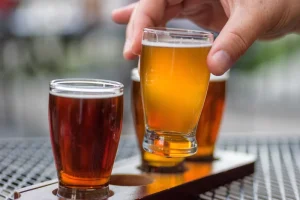
People who have less of this potassium channel have to drink more alcohol to get the same reward as people with normal levels. Without this potassium channel, alcohol can’t stimulate neurons and thus can’t release the much-beloved dopamine rush to our brains. We like feeling good, so the brain tells us to keep going back for more. For young people, particularly college students, here are some additional statistics to think about. About 90 percent of the alcohol in your blood is broken down by the liver.

Caregiver Stress and Burnout
Peer support can significantly reduce the frequency of binge drinking episodes. For individuals struggling with binge drinking, professional help and support groups can be effective in managing and overcoming this behavior. Binge drinking https://ecosoberhouse.com/ is influenced by various factors, including social pressure and the desire to fit in with peers. These factors can lead individuals to consume excessive amounts of alcohol in a short period, driven by the need to conform to social norms.

Stay on top of latest health news from Harvard Medical School.
Many people can recover if they go to a specialized rehab center that uses proven treatments. Alcohol treatment uses various methods to help with withdrawal and addiction. With these interventions, people can find health and happiness in sobriety. Adopting a healthy lifestyle is another critical aspect of maintaining sobriety. This includes prioritizing self-care, regular exercise, and a balanced diet, all of which contribute to physical and emotional well-being. Setting specific, achievable sobriety goals helps individuals stay focused and accountable.
Helping Someone with a Drug Addiction
- But bodies absorb alcohol differently depending on factors including body type and age.
- Binge drinking is influenced by various factors, including social pressure and the desire to fit in with peers.
- If you’re not sure if you or a loved one has a drinking problem or is at risk of becoming an alcoholic, professionals like Michaela Weaver can help.
- It can be challenging (but also helpful) to talk openly about your concerns about binge drinking with trusted friends and family.
- For example, a 2018 meta-analysis found a significant increase in alcohol use and binge drinking over the past 10–15 years, but not among all demographics.
- By Buddy TBuddy T is a writer and founding member of the Online Al-Anon Outreach Committee with decades of experience writing about alcoholism.
- Binge drinking is defined as elevating the blood alcohol concentration (BAC) to 0.08% or higher, typically after four drinks for women and five drinks for men in about 2 hours.
Some research even shows that the habit is increasing among older adults. Binge drinking involves a pattern of short but heavy bursts of alcohol use. When you drink like this, you consume enough alcohol over the course of two hours to raise your blood alcohol concentration to the legal limit of intoxication (0.08 percent in the U.S.) or higher. That translates to about four or more drinks for an adult female or five or more drinks for an adult male.
It’s sometimes due to peer pressure or a desire to feel less anxious or awkward in social situations. Tapering your alcohol use can take longer to stop drinking, but it how to stop binge drinking might be better long-term. Consider talking to a healthcare professional for a successful taper. There are things you can do to avoid binge drinking or stop altogether.
- And don’t be afraid to reach out to friends and get some fresh air if being stuck at home feels triggering at times.
- Almost 28 percent of 18- to 22-year-olds who are not enrolled in college full-time, and 33 percent of those who are full-time students, report binge drinking in the past month.
- It’s easy to fall into the trap of peer pressure, regardless of your age group.
- You might try cutting back on your drinking but find that you suffer headaches, fatigue, anxiety, or irritability on the days when you don’t drink.
- Take the assessment and get matched with a professional, licensed therapist.
- Ultimately, each person’s journey is unique, and personalized strategies must be developed to address individual challenges and needs in recovery.
- If you are a heavy drinker, the first risk that you face is developing an alcohol use disorder (AUD).
- This can be hard, especially if your closest friends are also your biggest drinking buddies.
- According to Dr. Streem, the bottom line is that Americans need to drink less alcohol.
- Setting boundaries for drinking and avoiding situations that encourage excessive alcohol consumption are also crucial steps in controlling binge drinking.
- Short-term risks include alcohol poisoning, which can impair vital brain functions and lead to potentially fatal outcomes.
- As there are many different kinds of malts, liquors and wines, it’s important to pay attention to the labels and serving sizes.